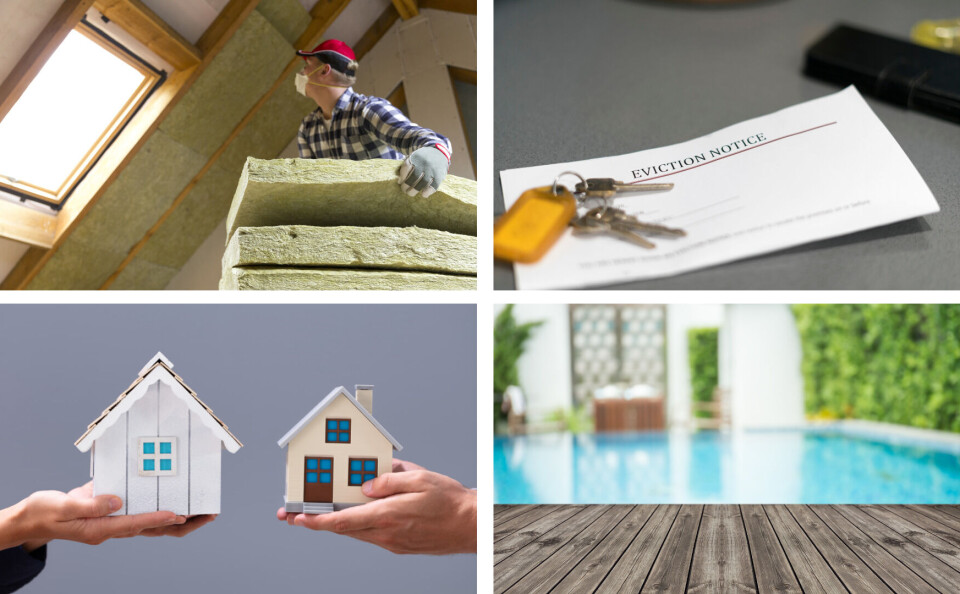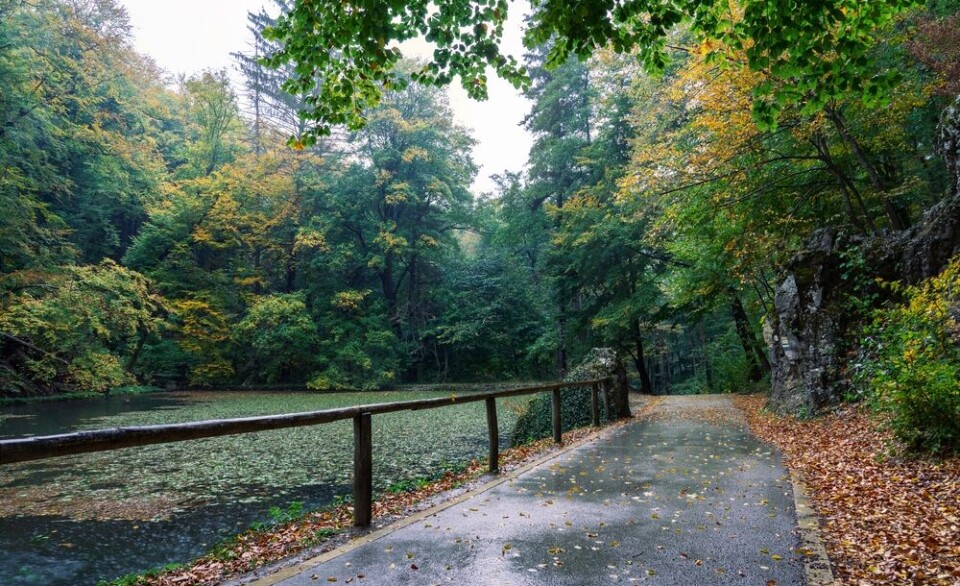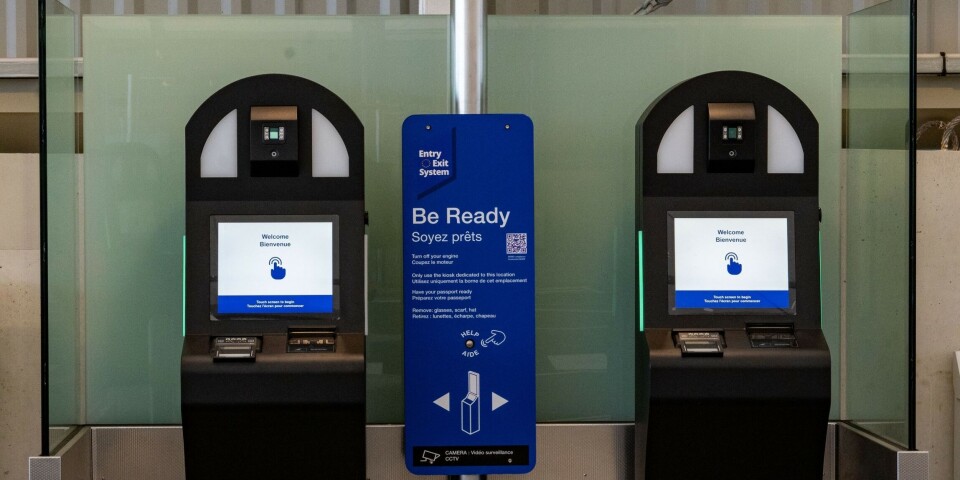-
Bin charges soar in many areas of France
One commune has seen fees rise by 90% in five years
-
How do French authorities check and enforce drought restrictions?
Some exceptions allow pools to be ‘topped up’ even at highest drought alert levels
-
Inside my 'stylish, soulful and sustainable' hotel renovation in the south of France
Planning a restoration project? We get some eco tips from the owner of a stunning refurbishment in the Aude
Renovation loans, evictions, house swaps: Five French property updates
We also look at tax authorities’ Google surveillance of garden pools in 2023

Interest-free loan of up to €30,000 now available for renovation work
An interest-free loan to help with home renovation costs is finally available to homeowners, up to a maximum of €30,000.
The éco-prêt à taux zéro (éco-PTZ) was first announced earlier this year, but only started being marketed in November.
Read more: Property renovation: new 0% loan to top-up French ‘MaPrimeRénov’ grant
It is designed to be used in conjunction with the MaPrimeRénov’ grant to reduce remaining costs not covered by those subsidies.
Set up in 2020, MaPrimeRénov' aims to help French people, whatever their income, to renovate their homes to reduce energy consumption and greenhouse gas emissions, such as by making heating changes and improving insulation.
Read more: Grant to renovate French homes is extended with a bigger budget
Minister for Housing Olivier Klein told RTL: "Today, there is significant aid. A family that has, for example, €20,000 of work to do to switch from an oil-fired boiler to a pellet boiler will receive aid of around €15,000, depending on their income, and there will be a balance of payments.
"This remaining cost is significant – up to €10,000 for some – and impossible to absorb, especially when you are on a more modest income, and it is those we want to help the most.”
The new loan is available to everyone, regardless of means.
It can be obtained from Banque Populaire and Caisse d'Epargne once a home owner’s MaPrimeRénov’ application has been approved by the National Housing Agency (Anah). Banque Postale, Crédit Mutuel and Crédit Agricole should offer it soon too.
All you have to show the bank is proof of the agreement from Anah of your MaPrimeRénov’ grant.
When combined with MaPrimeRénov’, the maximum amount of the eco-PTZ is capped at €30,000.
It cannot exceed the difference between the cost of the work being done (including taxes) and the total grants awarded to support that work.
You can apply for the loan after you have started the work in question, provided it did not begin more than six months earlier.
Landlords could soon end a defaulting tenant’s lease without taking legal action
MPs have voted in favour of new legislation that could let landlords end a tenant’s lease in the event of unpaid rent without resorting to the courts.
The aim of the bill is to speed up the time it takes for property owners to evict tenants who default.
At present, it is estimated that the average time between the first non-payment and the tenant actually leaving is 24 to 36 months.
But on Tuesday (November 29), 154 MPs against 50 voted to reduce this by adding a new ‘termination by right’ clause (clause de résiliation de plein droit) in rental contracts.
It means landlords would no longer have to initiate legal proceedings to obtain an eviction, although a judge would be able to suspend the clause if the tenant requests it.
Read more: Do former tenants have a claim on our French house?
The bill was put forward by Guillaume Kasbarian (Renaissance) for better protection of "small landlords who are not rolling in money", however opponents on the left have slammed it as "anti-tenants".
On Tuesday, the Assembly also adopted another article aimed at speeding up the litigation procedure for rental disputes, by reducing the minimum time between a summons and a hearing.
Both proposals were part of a raft of measures currently being debated in parliament to tackle unlawful occupation of properties, including a tripling of the penalties incurred by squatters to three years' imprisonment and a €45,000 fine.
Read more: Extra boiler aid, drought damage claims: Five French property updates
House swaps on the rise as people look to cut costs on holiday
A leading house swap platform has seen its membership jump by more than a third (37%) in one year as home owners look to economise on holidays during the cost of living crisis.
HomeExchange, based in Paris, now claims 98,500 members internationally (a third of whom are French).
Maria Casado Diaz, a researcher at the University of Bristol who has conducted a study on house swaps, told Le Monde: “The main motivation for people is economic."
The desire to have a more authentic vacation experience, away from tourist areas, has been cited as another driver.
Read more: Home exchange bookings in France are back at pre-Covid levels
Members pay a €150 annual subscription to use the HomeExchange website, which works by ranking the quality of their properties via a points system. These can then be used as a virtual currency to trade homes with other users.
In 80% of cases the exchanged house is a primary residence.
Despite garnering more interest in the past year, Charles-Edouard Girard, a partner at HomeExchange, told Le Monde that psychological obstacles are preventing more sign-ups.
"People are very interested in the concept, but they are afraid of leaving their house, of small accidents, of revealing their intimacy.”
Once this barrier is overcome, however, the platform boasts an impressive retention rate, with subscription renewals close to 90%.
People who rent are not excluded from house swapping – a French court last year ruled against a property owner who sought to terminate his tenant’s lease for using the HomeExchange service.
Those keen to try out the concept are advised to be flexible about dates and destinations, to make arrangements well in advance, and to be prepared for let-downs along the way – sometimes a successful ‘match’ comes off the back of 10 refusals first.
The most desirable properties on the site include those close to city centres with wow-factor interiors, homes in the countryside and properties boasting their own swimming pools or proximity to the sea or a lake.
Government hopes to make renovation easier in co-ownership buildings
The government is preparing two reforms aimed at making it easier for residents of copropriétés (shared apartment blocks) to push through renovation projects.
At present, two thirds of co-owners must agree to work being carried out for the project to go ahead.
FranceInfo reports that the Minister for Housing, Olivier Klein, is proposing to lower this to 50% of owners to encourage improvements to energy efficiency via renovations where necessary.
The government also wants to facilitate the holding of extraordinary general meetings in co-owned properties, where voting on building work normally takes place.
The plan is to allow these to be held remotely so as not to have to wait a year between each meeting.
The proposals are expected to be formally unveiled in January, just as new rules come in to prohibit the rental of properties with an energy efficiency rating (diagnostic de performance énergétique) of G – the lowest score possible.
Read more: Home energy efficiency: Key dates for property owners in France
Jean-Marc Torrollion, president of the Fédération nationale de l’immobilier (FNAIM), told FranceInfo that they could be "a good thing" but that the measure relating to the 50% majority would need to be "nuanced" so that it did not lead to “an unsustainable budget for all co-owners”.
Renovations cost an average of €20,000 per co-owner.
At present, 30% of housing in France is in co-ownership, yet this sector accounts for just 1% of applications for government renovation grants under the MaPrimeRénov’ scheme.
Read more: Explained: How to apply for a renovation grant for your French home
Tax office envisages big gains from Google Earth pool tracking
The use of Google Earth satellites is to be gradually extended to more areas of France in 2023 after proving a lucrative tool to track undeclared swimming pools in a trial.
A total of 20,356 pools have been found using the technology since it was trialled in nine departments, leading to €9.8million in taxe foncière being recovered in 2021, according to the Direction générale des finances publiques (DGFiP) government body.
Using Google software, authorities can compare satellite images showing pools in gardens with the tax registers, to see if the pools have been declared or not.
Under the French tax system, pools are thought to add to the value of properties (calculated on rental values) and so attract higher taxe foncière (as well as a one-off tax when they are built).
Read more: How much of our tax bill is due to having a swimming pool?
The finance ministry is expecting that €40million will be recovered once the Google cameras have looked at the whole of the country.
Read more: Undeclared swimming pool detection system to be used across France
The service is also likely to be used in future to check the tax status of extensions, conservatories, garages or other unexplained buildings which appear on the photos but which do not match tax declarations.
However, early trials showed these results were difficult to analyse and probably will not lead to tax windfalls.
Related articles
Tax rise for home pools, market slowdown: Five French property updates
MAP: Latest house price rises in France - how has your area fared?
Small towns escape price rise slowdown: French property market trends
























